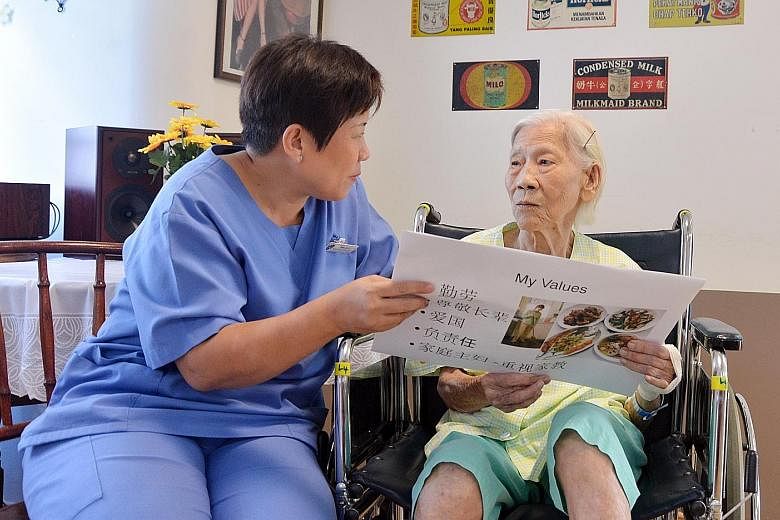Madam Mary Ho Kiat Fong, 91, has dementia but is able to look after herself.
One in five aged between 75 years and 84 years has dementia and most, like Madam Ho, have mild dementia. But there are some with moderate and severe dementia, and are dependent on caregivers.
More than half the people here aged 85 years and older have dementia.
The high prevalence of dementia, affecting about 70,000 people here, was discovered by a large in-depth study funded by the Ministry of Health and the Singapore Millennium Foundation of the Temasek Trust.
While there is no cure, there are ways to prevent or delay its progression, especially in the early stages or before it sets in.
Close to a third of dementia cases is caused by silent strokes that result from uncontrolled high blood pressure. Good control of blood pressure could reduce the prevalence of dementia. Once a person suffers a stroke, his risk of getting dementia goes up sevenfold.
Mr Zee Yoong Kang, chief executive officer of the Health Promotion Board, hopes the Enhanced Screen for Life programme that starts in September will help reduce dementia rates by identifying people with high blood pressure and having them treated.
The scheme gives 1.8 million Singaporeans aged 40 years and older access to health screening and the follow-up consultation, for $5 or less.
By 2030, one in four people here would be aged 65 years and older. A person's advancing age is a significant factor in predicting dementia.
A Well-being of the Singapore Elderly (Wise) study has thrown up other factors that add to the risk of getting dementia and, unlike age, some of these can be modified.
The study of more than 2,500 older people here found that retirees are 30 times more likely to get dementia than someone of the same age who is still working, regardless of whether it is full- or part-time work.
The Government's move to extend the recontract age of employees from 65 years to 67 years from this month could reduce dementia here if people work for longer.
Dr Mythily, director of research at the Institute of Mental Health and one of the lead researchers in the Wise study, said working later into life could delay cognitive decline.
Another significant finding is that Indians are the least likely to get dementia among the major races here. This is supported by studies in India and China that found that the Chinese were far more likely to get severe dementia than Indians.
Researchers attribute this to the high consumption of turmeric by Indians, which "has antioxidant and anti-inflammatory effects and decreases amyloid protein synthesis".
Amyloids are associated with Alzheimer's, a form of dementia, and turmeric is known to reduce the production of this.
Higher educational attainments also holds off dementia.
The Wise team postulated that "individuals with higher levels of education have greater reserve capacity" and can cope with greater changes to the brain before dementia hits them.
-
Three stages of dementia
It can take between a few years to a few decades for dementia to progress from mild to severe, depending on the interventions taken to delay its progression, said Professor Chong Siow Ann, the vice-chairman of the Institute of Mental Health's Medical Board (Research).
There are three general stages of dementia:
•Mild: Some memory loss, has difficulty solving problems and needs prompting but able to take care of personal needs.
•Moderate: Needs assistance with personal care, able to do only simple chores, impaired judgment and not able to go out independently.
•Severe: Cannot remember people or how to do things, including personal care.
Salma Khalik
Professor Kua Ee Heok, a senior psychiatrist at the National University of Singapore who specialises in dementia, said "cognitive decline can be prevented or delayed" with diet, exercise, mindfulness practice, art activities, music reminiscence and gardening. Such activities keep the mind limber.
This is why Madam Ho takes part in St Andrew's Community Hospital's Life story sessions, where dementia patients share their own experiences.
Ms Anna Lee, occupational therapy manager of inpatient therapy services at the hospital, explained: "Such sessions help them to boost their overall well-being, to feel valued as a person who have made contributions and preserve their sense of identity."
•To find out more about Preventing, Delaying And Coping With Dementia, go to the free AskST talk at the Health & You exhibition at Suntec Convention Halls 401 to 403, on Saturday at 11am. The session is chaired by ST health correspondent Salma Khalik and features Professor Kua Ee Heok of the National University of Singapore, Dr Marcus Tan, geriatric psychiatrist at the Institute of Mental Health, and Ms Anna Lee, manager (occupational therapy) at Saint Andrew's Community Hospital.



